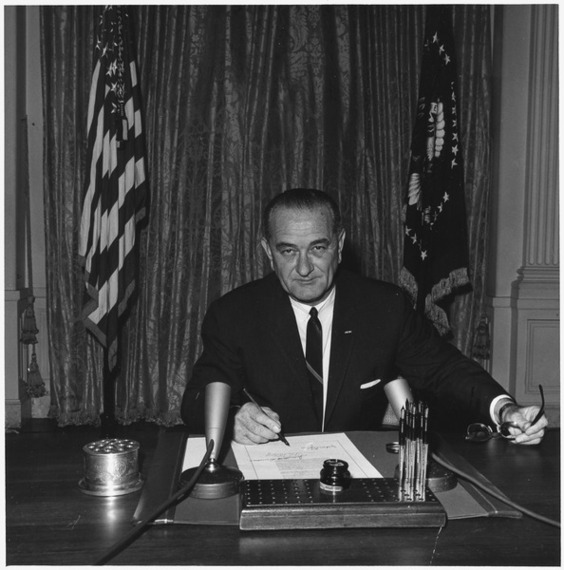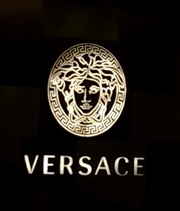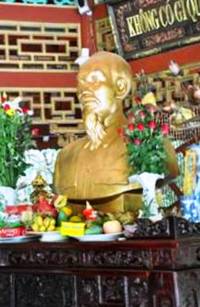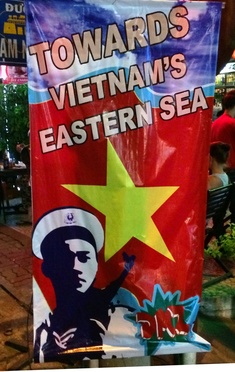HOI AN, VIETNAM. "I believe that history will record that we have made a great mistake," Sen. Wayne Morse (D, OR) declared fifty years ago this week. He was referring to congressional passage of the Gulf of Tonkin Resolution, the decisive step into one of the greatest tragedies in American history. That resolution would be used for nearly a decade by Presidents Lyndon B. Johnson and Richard M. Nixon as authorization to conduct war in Vietnam.
A look at Vietnam today makes plain just how mistaken and tragic the American venture into war there was. First, though, a brief summary of how the decisive turn into that disastrous mistake a half century ago occurred.
A BLANK CHECK FOR WAR
 Nearly unanimous (of the 516 members of Congress who voted, only Morse and Sen. Ernest Gruening of Alaska opposed) passage of the resolution was secured on August 7, 1964, on the basis of the claim that three days earlier North Vietnamese boats had launched an unprovoked attack on two American ships. Believing that the argument that he was "soft" on communism and the fight in Vietnam was the only thing that Republican nominee Barry M. Goldwater had as a potentially effective argument against him in the November election, President Johnson seized upon the apparent attack to get what he had wanted for months: a Congressional resolution giving him a blank check to conduct whatever military operations in Vietnam he deemed necessary and that would pass "quickly, overwhelmingly, and without too much discussion of its implications."
Nearly unanimous (of the 516 members of Congress who voted, only Morse and Sen. Ernest Gruening of Alaska opposed) passage of the resolution was secured on August 7, 1964, on the basis of the claim that three days earlier North Vietnamese boats had launched an unprovoked attack on two American ships. Believing that the argument that he was "soft" on communism and the fight in Vietnam was the only thing that Republican nominee Barry M. Goldwater had as a potentially effective argument against him in the November election, President Johnson seized upon the apparent attack to get what he had wanted for months: a Congressional resolution giving him a blank check to conduct whatever military operations in Vietnam he deemed necessary and that would pass "quickly, overwhelmingly, and without too much discussion of its implications."
AN ATTACK THAT DIDN'T HAPPEN
As Johnson was moving to launch retaliatory airstrikes against North Vietnam on August 4, reports reached the Pentagon from the scene off the coast of North Vietnam that there was serious doubt that an attack had occurred and from Admiral Ulysses S. Grant Sharp, Jr., at Pacific Command in Hawaii, suggesting that "a 'complete evaluation' be undertaken before any further action." There is no indication that Defense Secretary Robert S. McNamara informed the President of these communications during the crucial hours when the airstrikes were being set in motion.
A 2000 National Security Council historical study reached an unambiguous conclusion about the alleged North Vietnamese attack on August 4: "No attack happened that night." But an event that didn't happen led to a resolution that served as the concept sketch for the script of a major tragedy.
Fifty years later, the magnitude of that mistake is unmistakable in Vietnam.
Among the reasons given for undertaking the war, the most prominent were to block the expansion of Chinese influence into Southeast Asia and to oppose communism.
What was needed to accomplish the first objective was a strong, unified Vietnam. The Vietnamese have hated China for two thousand years, and having a communist government would not alter that basic fact in any way. Ho Chi Minh was by far the best bet to achieve this American goal.
Less than four years after Hanoi's reunification of Vietnam in 1975, the Communist regime was engaged in a brief but bloody border war with its putative comrades from China. And currently tensions between the two countries over islands in the South China Sea (Vietnam rejects that name and calls it the Eastern Sea) are high. Vietnam and the United States find themselves virtual allies in opposing Chinese expansionism.
MORE SOCIAL DARWINIST THAN SOCIALIST
As for the other main war aim, how communist is Vietnam in 2014?
There is a store in Hanoi called "Shop Aholic." There must be steel cables restraining the preserved body of Ho Chi Minh so it doesn't spin in its glass coffin in the nearby mausoleum.

On a walk in Saigon--its current official name notwithstanding, it is not now and never has been Ho Chi Minh's city--from Notre Dame down Dong Khoi (the famous Rue Catinat in the days of the French Empire, when it was considered Saigon's Champs Élysées) to the Hotel Continental, the Opera House, and beyond, one passes all the familiar ration outlets of a communist country: Cartier, Versace, Dior, Piaget, Hermes, Louis Vuitton, Rolex . . . . "Dong Khoi" means "Total Uprising Street." The total uprising taking place along it and throughout Vietnam is an explosion of capitalism.
When one visits the still more-or-less-communist country of Cuba, among the many indelible impressions is the nearly complete absence of trucks on the highways. They have no products to move around. Has anyone ever seen "Hecho en Cuba" on anything? They make, in a word, nada. Superimpose the roads in Vietnam on those in Cuba and the result would be a chiaroscuro painting. Vietnam's highways are clogged with trucks moving goods around, reflecting the entirely market-based economy in this nominally socialist country.
If they look at many aspects of Vietnam today, conservative Republicans in the United States might see the paradise of which they dream. This "socialist" nation has a paddle-your-own-canoe-or-sink economy. There is no welfare, no minimum wage, no unemployment insurance, no national healthcare, no old-age pensions for most people, no free education beyond middle school ....

Ho Chi Minh's countenance appears everywhere in contemporary Vietnam, benevolently smiling upon policies that he strongly opposed. It is much like the situation with many "Christians" in the United States who do the opposite of what Jesus taught. The farther self-identified followers get from the teachings of their supposed leader, the louder they proclaim his name. Uncle Ho has been deified--to the point of being portrayed like the Buddha on a lotus blossom. But when it comes to actual economic practice in Vietnam today, the altars at which worship takes place are those of William Graham Sumner and Ayn Rand.
But outside the economic realm the role of government is large. Vietnam remains a one-party political system in which corruption is rife and basic freedoms are restricted. The Vietnamese receive none of the benefits of positive government, but bear all the burdens of negative government. There are neither political nor economic checks and balances.
A proposal was made in 2013 to change the country's official name from the "Socialist Republic of Vietnam" back to what Ho had named it in 1945: the "Democratic Republic of Vietnam." That would constitute a lateral move--from one wholly inaccurate name to another, equally inaccurate, one. By no stretch of the imagination is contemporary Vietnam either socialist or democratic.
If they want to adopt a name that reflects reality, they should call the nation the "Social-Darwinist Dictatorship of Vietnam."
A WAR FOR NOTHING
American policymakers in 1964 sought a Vietnam that was capitalist, would block China, and with which they could have good relations.
The United States fought a war at terrible cost to achieve those ends and lost. Today, though, Vietnam is staunchly capitalist, adamantly opposed to China, and friendly to the United States. Had the war never been fought, it is highly likely that all of those ends would have been achieved at a much earlier date.
What, then, was this "bitch of a war," as Lyndon Johnson would later call it, to which the President proposed marriage a half century ago this week, with the Gulf of Tonkin Resolution as the engagement ring, good for?
Absolutely nothing.
Robert S. McElvaine is Chisholm Professor of Arts & Letters at Millsaps College. He is currently completing a book, "The Times They Were a-Changin' - America in 1964."}

